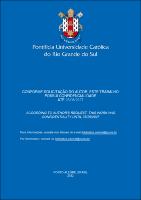| Share record |


|
Please use this identifier to cite or link to this item:
https://tede2.pucrs.br/tede2/handle/tede/10393| Document type: | Tese |
| Title: | Polícia! para quem precisa de justiça : como a magistratura representa a violência policial |
| Author: | Muniz, Mariana Py,  |
| Advisor: | Azevedo, Rodrigo Ghiringhelli de |
| Abstract (native): | Questiona-se qual é a representação social da violência policial para a magistratura do Estado do Rio Grande do Sul. O que se considera como lícito ou não, dado o mandato para a utilização da força destinado às polícias, em virtude do monopólio do exercício da violência por parte do Estado, bem como quais implicações se extraem do sentido conferido a esse fenômeno social. Para tanto, justificamos a escolha da temática em virtude de experiência profissional desenvolvida à frente da coordenação do Centro de Referência em Direitos Humanos da Defensoria Pública do Rio Grande do Sul. Temos como pressuposto que a violência policial é um fenômeno estrutural e institucionalizado. Com Lima, reforçamos a constatação de que a polícia trabalha com um conceito hierárquico de cultura ao classificar a população vigiada, o qual a ideologia jurídica, oficial e extraoficial, apoia. Pela teoria das representações sociais, tencionamos verificar de que forma o Judiciário contribui para a construção do social. Com Bourdieu pretendemos desvelar esse campo jurídico e judicial, bem como, com alicerce em suas proposições, pretendemos demonstrar que a violência policial no Brasil, por se encontrar incorporada às estruturas regulamentares de repressão (Holloway), constitui-se em estrutura estruturante da própria sociedade brasileira e do campo jurídico. Ao depois, quer-se transitar pela estruturação do Poder Judiciário, composição e formação, bem como pelas suas características inquisitoriais, as quais reproduzem a hierarquização, a desigualdade, o conservadorismo, havendo por parte desse Poder uma aproximação da representação dada pelo senso comum à violência policial, com a sua consequente legitimação. Objetivamos verificar de que forma o Judiciário tem atuado nessa temática, razão pela qual a metodologia compreenderá revisão bibliográfica, documental e jurisprudencial, análise de decisões judiciais, além da coleta de dados empíricos, com observação participante e aplicação de entrevistas semiestruturadas. |
| Abstract (english): | It is questioned what is the social representation of police violence for the State Magistracy of RS. What is considered lawful or not, given the mandate for the use of force for the police, due to the monopoly on the exercise of violence by the State, as well as what implications are drawn from the meaning given to this social phenomenon. Therefore, we justify the choice of the theme due to professional experience developed in front of the coordination of the Human Rights Reference Center of the Public Defender of RS. We assume that police violence is a structural and institutionalized phenomenon. With Lima, we reinforce the observation that the police work with a hierarchical concept of culture when classifying the population under surveillance, which the legal, official and unofficial ideology supports. Through the theory of social representations, we intend to verify how the Judiciary contributes to the construction of the social. With Bourdieu we intend to unveil this legal and judicial field, as well as, based on his propositions, we intend to demonstrate that police violence in Brazil, as it is incorporated into the regulatory structures of repression (Holloway), constitutes a structuring structure of Brazilian society itself and the legal field. Afterwards, we want to move through the structuring of the Judiciary, composition and training, as well as its inquisitorial characteristics, which reproduce hierarchization, inequality, conservatism, with this Power approaching the representation given by common sense to police violence, with its consequent legitimation. We aim to verify how the Judiciary has acted on this theme, which is why the methodology will include bibliographic, documentary and jurisprudential review, analysis of judicial decisions, in addition to the collection of empirical data, with participant observation and application of semi-structured interviews. |
| Keywords: | Sociologia da Violência Sociologia do Conhecimento Violência Policial Poder Judiciário Democracia Sociology of Violence Sociology of Knowledge Police Violence Judicial Power Democracy |
| CNPQ Knowledge Areas: | OUTROS::CIENCIAS SOCIAIS CIENCIAS HUMANAS::SOCIOLOGIA |
| Language: | por |
| Country: | Brasil |
| Publisher: | Pontifícia Universidade Católica do Rio Grande do Sul |
| Institution Acronym: | PUCRS |
| Department: | Escola de Humanidades |
| Program: | Programa de Pós-Graduação em Ciências Sociais |
| Access type: | Acesso Aberto |
| Fulltext access restriction: | Trabalho será publicado como artigo ou livro |
| Time to release fulltext: | 60 meses |
| Date to release fulltext: | 26/08/2027 |
| URI: | https://tede2.pucrs.br/tede2/handle/tede/10393 |
| Issue Date: | 26-Mar-2021 |
| Appears in Collections: | Programa de Pós-Graduação em Ciências Sociais |
Files in This Item:
| File | Description | Size | Format | |
|---|---|---|---|---|
| TES_MARIANA_PY_MUNIZ_CONFIDENCIAL.pdf | MARIANA_PY_MUNIZ_TES | 259.68 kB | Adobe PDF |  Download/Open Preview |
Items in DSpace are protected by copyright, with all rights reserved, unless otherwise indicated.




